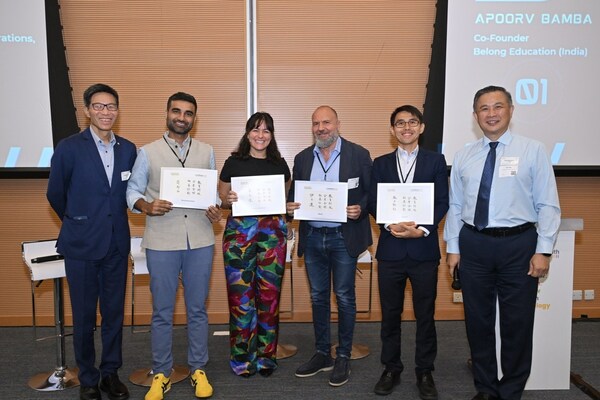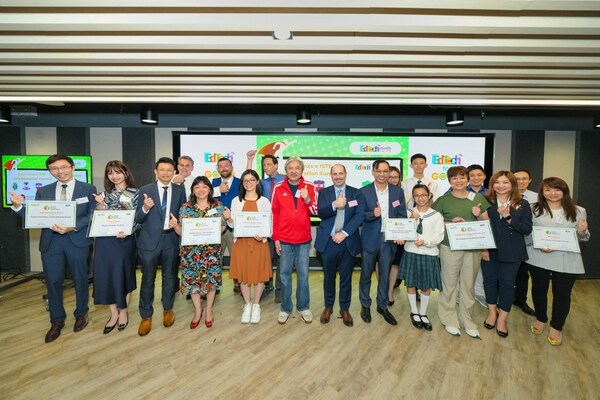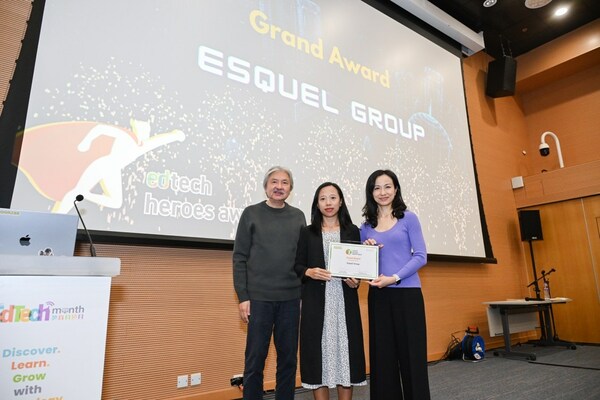HONG KONG, Oct. 17, 2023 /PRNewswire/ -- Esperanza is a charitable organisation established in 2018 to advocate new ways to learn, live and work. In partnership with the International Society for Technology in Education (ISTE) and the Minerva Project, they brought together over 40 experts from all over the world to share innovative solutions, case studies and best practices in the applications of technology that bring significant benefits to educators, learning & development (L&D) professional and learners, from K12 to enterprise learning.
Calling for Early Adopters of Education Technology
Kicking off the K12 Summit on 12 Oct was a video symbolizing Esperanza's call for everyone to be leaders in propelling a learning innovation movement. Earlier this year, Esperanza launched the EdTech Heroes Award to celebrate early adopters of education technology in Hong Kong. (See Award Winners in the Annex).
EdTech Applications in Schools: Conditions for Success
Joseph South, Chief Innovation Officer of ISTE. illustrated the pervasive influence of AI and advocated the imperative to shift from rote learning to skills development. "We need to foster students' identities as global collaborators, innovative designers and AI creators … and we can use technology to that." said South. "Ultimately it's our choice whether technology makes us more human or less human" he concluded.
South was joined by Benjamin Sheridan, an education consultant and Philip Law, Vice Principal of the Education University of Hong Kong Jockey Club Primary School, the Grand Award Winner of the EdTech Heroes Award. The panel discussed the role of AI in offering personalised learning and how it enables authentic and skill-based evaluation. When considering EdTech tools for integration, it is important to define goals and learning objectives. Usability, cultural alignment, and adaptability are critical factors. Teachers' confidence and competence with technology are pivotal for successful integration. Fostering a culture of joyful and safe tech use is vital to counter staff tech fatigue and encourage innovation.
EdTech Applications by Award Winning Solution Providers
The winners of 2023 Edventures Global Acceleration Fellowship, a global competition to identify fast growing EdTech startups, presented how technology motivates learning (House of Math, Norway) facilitates personalized and adaptive learning (Century Technology, UK) and early childhood development (iBlüm, Canada and Lamsa, UAE). They are joined by 2020 Fellows MEL Science and Zzish from the UK and Mandarin Matrix from Hong Kong.
AI accelerates the urgency to reinvent higher education
The adult learning track started out with a thought provoking dialogue between Ben Nelson, the Founder of Minerva University, and George Siemens, Chief Scientist at SNHU's Human Systems, moderated by John C Tsang, Founder of Esperanza. Nelson pinpointed that the advent of Generative AI has exposed the limitations of universities as certification institutions. The outdated learning model and assessment framework can neither address the needs of students nor the society. It is high time for universities to rethink the purpose of higher education with AI becoming an integral part of the consideration. Referring to the existential threat of mankind if AI is not thoughtfully and intentionally adopted, Siemens underscored the historical function of universities in developing thoughtful individuals. "Education institutes and organisations that can make people more human are the ones that will succeed," he concluded.
Role of AI in delivering Human-Centred approach to teaching and learning
The need for a human-centred education was echoed by Matthew Rascoff, Vice Provost, Digital Education, Stanford University. Rascoff argued that technology has democratised learning but the real challenge is how it can humanise education at scale. "MOOCs did a great job of democratizing, but did a horrible job of humanizing education," he said. .Quoting Stanford's Code in Place programme, he demonstrated how Natural Language Processing might hold the key to scaling up not only personalized learning for students but personalized professional learning for teachers by making one-on-one, personal feedback from teachers possible and cost effective.
Closer to home, Prof Sook Kyoung Cho and Dr Chulmin Yoon of Korea Institute of Technology Institute introduced their partnership with Minerva to nurture durable life skills in their engineering programme. They explained how their university has adapted the Minerva programme in the Korean cultural context and showed how the use of technology has helped students develop humanistic skills.
Enhancing Employability of Students Through EdTech
Critical thinking has become one of the most essential durable skills with the advent of AGI. Macat (UK), a 2023 Edventurs GBA Fellow, introduced its PACIER framework to assess and develop critical thinking. Belong Education (India) and Virtual Internships (UK/Vietnam) showed how AI and other technology are used to enhance the employability of students and bridge the gaps between industry and the academic world. Classin (Mainland) demonstrated how its state-of-the art hardware and software provide a seamless hybrid learning experience.
Reskilling and upskilling the workshop with the help of EdTech
In the afternoon of 13 October, the focus switched to the imperative of workforce reskilling and upskilling, with AI and automation displacing millions of jobs in the not-too-distant future. Workera (US) started with how AI can be used to do granular analysis of skills requirements and help organisations formulate their talent development and acquisition strategies. Odilo (Spain) introduced its personalized learning ecosystem powered by AI. ThriveDX (Israel) showed how cross-company training programmes on cyber security are made possible with technology.
EdTech Applications in Companies: Conditions for Success
An expert panel shared the WHY, WHAT and HOW of integrating technology in companies' learning and development strategy. The panel comprised Carol Chuah (Head, Learning & Development, LinkedIn South East Asia), Nick Kind (Managing Director, Tyton Partners) and Bessie Chong (Director of Partnership Development, Esquel Group) and Grand Award Winner (Enterprise) of EdTech Heroes Award. Technology has made it possible to create greater access for learning, uncover the skills gap and untapped potential via data-driven insights. To make the transformation successful, panelists highlighted the need to develop a learning culture with leaders leading by examples. Chong showed how Esquel minimizes the learning barriers by using easy to use technology tools, integrating the learning in the flow of work and providing staff with a safe environment to experiment as well as incentives. A recurring theme was that we should not start with technology but with an understanding of the organisation needs and the learning objectives, and develop ROI at the business level.
Role of Government, Industry and Professional Organisations
Kind posited that technology has the potential to reskill the workforce at scale, but has yet to show transformative impacts as governments and organisations have yet to embrace it to the full. The panel discussed the need to address talent development at an industry, country and regional level, as opposed to individual organizations trying to solve these issues in isolation. Kind highlighted the need for a common language and an infrastructure. Using the example of the Singapore government, Chuah underlined the importance of government and industry collaboration.
We Need More Heroes
It is high time organisations treat the workforce as its most important asset. The speed of change is not going to slow down. Technology, applied in the correct context, can unleash human potential and transform organisations and society. What we do in the next few years will determine the state of humanity for future generations to come. The choice is ours, but we must act. Going back to the opening theme of the Summit, we need more heroes to "motivate us to do things we never imagined we could do", as summed up Brian Tang, the MC of the Summit and the Executive Director of LITE Lab at the University of Hong Kong.
Annex 1
EdTech Heroes Award Winners
K12 Track
Grand Award: The Education University of Hong Kong Jockey Club Primary School
Vision Award: Victoria Shanghai Academy
Stakeholder Engagement Award: Po Leung Kuk Choi Kai Yau School
Choice of Solution Award: BrainX Training Center
Implementation Award: Fukien Secondary School Affiliated School
Learning Experience Award: Kowloon Bay St. John The Baptist Catholic Primary School
Adult Learning Track
Grand Award (Enterprise): Esquel Group
Grand Award (Higher Education): Hybrid Immersive Virtual Environment (HiVE), The Hong Kong Polytechnic University
Vision Award: MTR Operations Training Department
Stakeholder Engagement Award: Law, Innovation, Technology & Entrepreneurship Lab, Faculty of Law, The University of Hong Kong
Choice of Solution Award: Soruki EdTech Limited, The University of Hong Kong
Implementation Award: HKUST Digital MBA for Global Leaders, The Hong Kong University of Science and Technology
Learning Experience Award: Educational Development Centre, The Hong Kong Polytechnic University
Annex 2
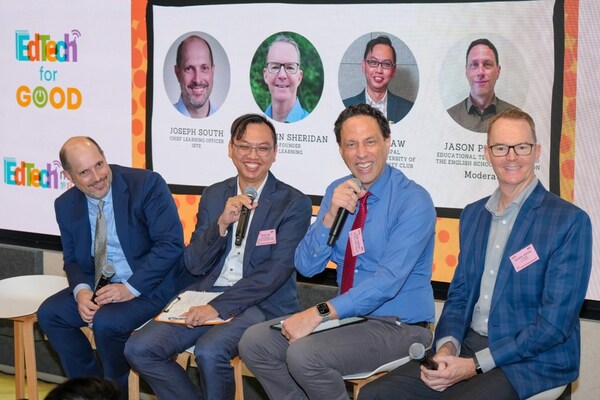
Photo 1: (From left to right) Joseph South (Chief Learning Officer, ISTE), Philip Law (Vice Principal of the Education University of Hong Kong Jockey Club Primary School), Jason Prohaska (Educational Technologies Lead, The English Schools Foundation), Benjamin Sheridan (Co-founder, 407 Learning)
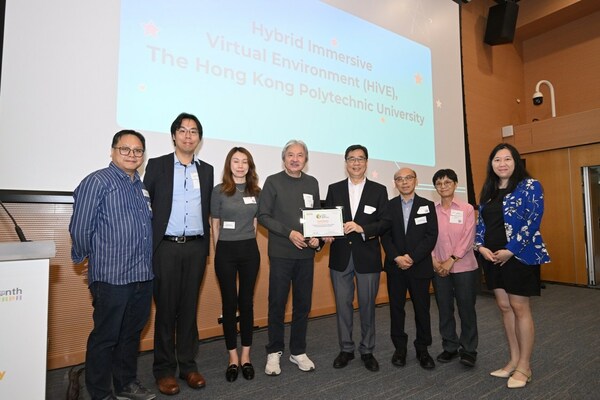
Photo 4:Presentation of the Grand Award (Higher Education) of EdTech Heroes Awards to Hybrid Immersive Virtual Environment (HiVE), The Hong Kong Polytechnic University
source: Esperanza
【etnet 30周年】多重慶祝活動一浪接一浪,好禮連環賞! ► 即睇詳情
